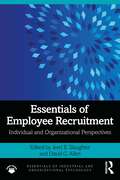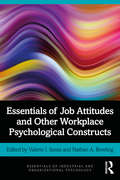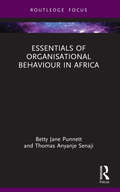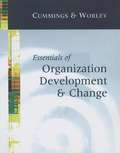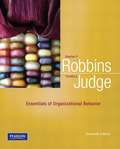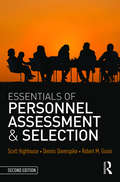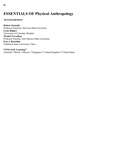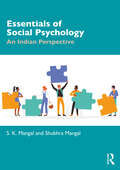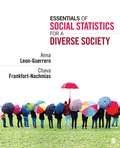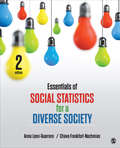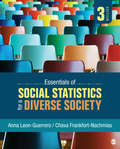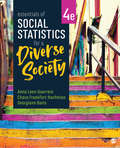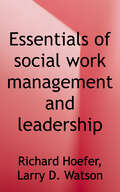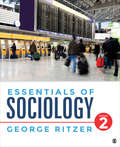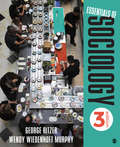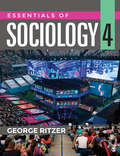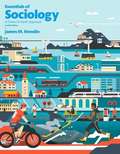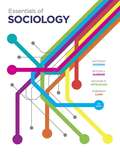- Table View
- List View
Essentials of Employee Recruitment: Individual and Organizational Perspectives (Essentials of Industrial and Organizational Psychology)
by David G. Allen Jerel E. SlaughterThis book provides an insightful and comprehensive summary of the field of employee recruitment. Written from a scientific evidence-based perspective, and with contributions from global experts, it reviews the relevant research in the various areas of recruitment, considers the most pressing current issues in studying recruitment topics, and designs future research agendas for the field.Organized into four sections, the text begins by presenting an overview of the study of recruitment, before moving on to demonstrate effective ways of attracting talent, covering methodology, practices, and organizational characteristics. The third section focuses on recruiting specific populations, including women, ethnic and racial minorities, college students, and employed job seekers. This book concludes by providing practical perspectives, with chapters describing how the applicant population is changing, how applicants interact with people and technology during recruitment, the interaction of applicant and organizational political ideology, and offering insights on how to design recruitment programs today and in the future.A foundational resource on employee recruitment, this is the ideal text for scholars and graduate students in industrial and organizational psychology and human resource management. It will also interest practitioners working in the area, along with executive and line managers tasked with responsibility for talent management.
Essentials of Health Justice: A Primer
by Joel B. Teitelbaum Elizabeth Tobin-TylerThis book examines the social and structural determinants of health, systems of care for underserved populations, health equity, social justice and health policy. Unlike other texts of its kind, this book uniquely focuses on the legal, structural, and justice issues underlying health disparities; the adequacy of current safety net programs and legal protections affecting the health of vulnerable populations; health policy, law and system design focused on achieving health equity; and concrete strategies for bringing about change to promote health justice. This book can serve as a stand-alone text or supplement for a range of undergraduate, graduate, law, public health, medical, nursing and other health professions courses.
Essentials of Job Attitudes and Other Workplace Psychological Constructs
by Valerie I. SessaAlthough the topic of job attitudes and other workplace psychological constructs such as perceptions, identity, bonds, and motivational states is important, there are no books addressing the topic as a whole. Essentials of Job Attitudes and Other Workplace Psychological Constructs seeks to fill that void in a comprehensive edited volume that compiles chapters by experts on each construct. Essentials of Job Attitudes and Other Workplace Psychological Constructs begins with a review of the concept of job attitudes and other workplace psychological constructs, then devotes a single chapter to each construct. These chapters focus on organizational justice, perceived organizational support, organizational identification, job involvement, workplace commitments, job embeddedness, job satisfaction, employee engagement, and team-related work attitudes. Each of these chapters addresses parallel content including definitions, history, theory, a critique of the field to date with future research recommendations, and how the given construct can be used in practice. There are two additional features that make this book unique: first, each chapter provides a nomological network figure of the workplace psychological construct addressed; and second, each chapter provides one or more of the current measures used to assess the construct of interest. Essentials of Job Attitudes and Other Workplace Psychological Constructs is an ideal text for students and professionals in industrial-organizational psychology, organizational behavior, and human resource management.
Essentials of Organisational Behaviour in Africa (Essentials of Business and Management in Africa)
by Betty Jane Punnett Thomas Anyanje SenajiA concise textbook focusing on organisational behaviour in the African context, this book is featured in Routledge’s new Essentials of Business and Management in Africa shortform textbook series. This book covers organisational behaviour concepts applicable to the African continent and its varied cultures. Chapters thoroughly explore topics including personal and individual factors, motivation, decision making and communication, groups and teams, leadership and influence, conflict, and negotiation. Each chapter refers to aspects of the African context such as cultural values, Ubuntu, and the informal economy and relates these to the topics discussed. The book includes illustrative real-life examples, vignettes, mini-cases and exercises. Undergraduate and postgraduate students in Africa, and with an interest in the area, will appreciate the focus on a region so little discussed in the business and management literature. Filling a gap in the literature and including a dearth of material, this book will also appeal to current and future practicing managers in African countries, as well as those employed in government and by Non Governmental Organisations (NGOs).
Essentials of Organizational Behavior
by Stephen P. Robbins Timothy A. JudgeFor one-semester undergraduate and graduate level courses in Organizational Behavior. Concise fundamentals for students. Ultimate flexibility for instructors. This bestselling, brief alternative for the OB course covers all the key concepts needed to understand, predict, and respond to the behavior of people in real-world organizations. This text also includes cutting-edge topics and streamlined pedagogy to allow maximum flexibility in designing and shaping your course. The eleventh edition contains expanded and updated coverage on international issues, as well as new sections on the management of information, safety and emotions at work, risk aversion, self-determination theory, managing information, and downsizing. Accompanied by mymanagementlab! See the hands in the air, hear the roar of discussion-be a rock star in the classroom. mymanagementlab makes it easier for you to rock the classroom by helping you hold students accountable for class preparation, and getting students engaged in the material through an array of relevant teaching and media resources. Visit mymanagementlab.com for more information.
Essentials of Organizational Behavior (10th edition)
by Stephen P. Robbins Timothy A. JudgeWith updated examples and research but purposely minus such learning aids as review questions, this edition meets its goal of offering an alternative to much lengthier texts in the organizational behavior field. Robbins (San Diego State U.) discusses OB topics relating to ethics, diversity, and globalization throughout rather than in stand-alone chapters. The organizational culture section includes a discussion of workplace spirituality. A companion Web site and other supplements are available. Annotation c. Book News, Inc., Portland, OR (booknews.com)
Essentials of Personnel Assessment and Selection
by Scott Highhouse Robert M Guion Dennis DoverspikeThis second edition provides managers and students the nuts and bolts of assessment processes and selection techniques. With this knowledge, managers learn to make informed personnel decisions based on the results of tests and assessments. The book emphasizes that employee performance predictions require well-formed hypotheses about personal characteristics that may be related to valued behavior at work. It also stresses the need for developing a theory of the attribute one hypothesizes as a predictor--a thought process too often missing from work on selection procedures. Topics such as team-member selection, situational judgment tests, nontraditional tests, individual assessment, and testing for diversity are explored. The book covers both basic and advanced concepts in personnel selection in a straightforward, readable style intended to be used in both undergraduate and graduate courses in Personnel Selection and Assessment.
Essentials of Physical Anthropology
by Robert Jurmain Lynn Kilgore Wenda Trevathan Eric BartelinkConcise, well-balanced, and comprehensive, ESSENTIALS OF PHYSICAL ANTHROPOLOGY, 10th Edition, introduces you to physical anthropology with the goal of helping you understand why it is important to know about human evolution. <p><p>You'll learn how humans are biologically connected to all other life, including our ancient ancestors and our contemporary primate cousins, and how closely modern human populations are related to each other. Numerous high-quality visual diagrams, artwork, maps, photographs, and other learning tools will help you grasp the big picture of human evolution.
Essentials of Social Psychology: An Indian Perspective
by Shubhra Mangal Shashi Kumar MangalEssentials of Social Psychology: An Indian Perspective offers a comprehensive introduction to social psychology with a focus on the cultural and social fabric of Indian society. Split into five sections, the book covers the nature, scope, history and methods of social psychology; individual level processes; interpersonal level processes; social processes; group processes; and social issues. The authors, S.K. Mangal and Shubhra Mangal, address the latest research trends, and offer a varied insight into a range of topics including social influence, social exchange processes, group dynamics, aggression, prejudice and attitudes. The book also examines topical themes and includes two chapters on social issues facing contemporary Indian society. While highlighting significant Indian research contributions and including examples and case studies from an Indian context, this book goes on to examine the discipline in the context of the socio-psychological background of this subcontinent. Complex concepts are clearly explained and the book aids student learning through useful pedagogical features such as assessment questions, case studies, chapter summaries and boxed key points. Covering all the core topics within social psychology, this is an essential textbook for graduate or undergraduate courses in social psychology, social work, social neuroscience, community medicine or public health. In addition, it’s also a useful introduction for those taking the Psychology option for the Indian and Provincial Civil Services and other competitive examinations.
Essentials of Social Statistics for a Diverse Society
by Anna Y. Leon-Guerrero Chava Frankfort-NachmiasEssentials of Social Statistics for a Diverse Society is a briefer version of the successful Social Statistics for a Diverse Society now in its 6th edition. As in the parent text, the context of diversity, illustrated through the use of real data in examples from contemporary social issues, will continue to differentiate this briefer statistics text. Better illustrated with more interesting examples and exercises with aá focus on student learning, will set this book apart from its competitors. Features and Benefits: - The book's informal writing style -- coupled with the use of real-world examples makes the book more accessible and engaging for students. - A focus on race, class, gender and other aspects of social diversity sets the book apart from others in the field and mirrors the major emphasis in the social sciences today. - Reading the Research Literature sections in most chapters help students read and interpret statistical information in professional and scholarly publications. - Learning Checks within chapters engage students in reviewing key concepts and techniques. - Statistics in Practice extended examples show students applications to meaningful social issues. - Heavily illustrated with many charts, tables and graphs - Extensive end of chapter exercise sets.
Essentials of Social Statistics for a Diverse Society
by Dr Anna Leon-Guerrero Dr Chava Frankfort-NachmiasEssentials of Social Statistics for a Diverse Society, Second Edition provides students with a briefer, less expensive version of the successful Social Statistics for a Diverse Society, now in its Seventh Edition. As in the parent text, this concise statistics text puts a strong emphasis on the theme of diversity, which is illustrated through the use of real data in examples from contemporary social issues. The book’s informational and inviting writing style, coupled with the use of real-world examples and data applications, makes the book a more accessible and engaging resource for students.
Essentials of Social Statistics for a Diverse Society
by Dr Anna Leon-Guerrero Dr Chava Frankfort-NachmiasEssentials of Social Statistics for a Diverse Society, Third Edition, is a more streamlined, less expensive version of the successful Social Statistics for a Diverse Society. It is distinct for the use of real data from contemporary social issues and for a strong emphasis on race, class, gender, and other statuses. With a wide range of examples and exercises taken from current events and published research, frequent illustrations, and a focus on student learning, this book continues to be an accessible and engaging resource for students.
Essentials of Social Statistics for a Diverse Society
by Dr Anna Leon-Guerrero Dr Chava Frankfort-NachmiasEssentials of Social Statistics for a Diverse Society, Third Edition, is a more streamlined, less expensive version of the successful Social Statistics for a Diverse Society. It is distinct for the use of real data from contemporary social issues and for a strong emphasis on race, class, gender, and other statuses. With a wide range of examples and exercises taken from current events and published research, frequent illustrations, and a focus on student learning, this book continues to be an accessible and engaging resource for students.
Essentials of Social Statistics for a Diverse Society
by Georgiann Davis Dr. Chava Frankfort-Nachmias Dr. Anna Y. Leon-GuerreroEssentials of Social Statistics for a Diverse Society, by Anna Leon-Guerrero, Chava Frankfort-Nachmias, and Georgiann Davis, is a briefer version of the successful Social Statistics for a Diverse Society, and as in the parent text, the use of real data about contemporary social issues sets this book apart from others in the field. The text explains how to compute and interpret basic descriptive and inferential statistics while teaching and reinforcing important sociological concepts. In every chapter, the authors demonstrate how statistics is an important tool for studying and understanding the role of race, class, gender, and other statuses in a pluralistic society like the United States.
Essentials of Social Statistics for a Diverse Society
by Georgiann Davis Dr. Chava Frankfort-Nachmias Dr. Anna Y. Leon-GuerreroEssentials of Social Statistics for a Diverse Society, by Anna Leon-Guerrero, Chava Frankfort-Nachmias, and Georgiann Davis, is a briefer version of the successful Social Statistics for a Diverse Society, and as in the parent text, the use of real data about contemporary social issues sets this book apart from others in the field. The text explains how to compute and interpret basic descriptive and inferential statistics while teaching and reinforcing important sociological concepts. In every chapter, the authors demonstrate how statistics is an important tool for studying and understanding the role of race, class, gender, and other statuses in a pluralistic society like the United States.
Essentials of Social Work Management and Leadership: A Competency-based Approach
by Richard Hoefer Larry D. WatsonEssentials of Social Work Management and Leadership: A Competency-based Approach helps students not only build critical knowledge but also cultivate the unique skills that will help them develop into competent and successful managers and leaders. <p><p>Experiential exercises, informative case studies, and carefully crafted assignments based on the 2015 Council on Social Work Education's (CSWE) Educational Policy Accreditation Standards (EPAS) show students how to apply key concepts to gain career success. Each chapter of the text combines knowledge with competency-building exercises that fit into a newly refined conceptual model of the material. The model places the 2015 CSWE EPAS into strategic categories according to orientation, helping readers better understand how each skill functions within the discipline and how collectively, they can support a thriving and effective social work practice. The text delivers excellent insight, opportunities for action, and material that inspires students to become effective, confident, and capable leaders. Essentials of Social Work Management and Leadership is well suited for courses in social work and nonprofit leadership and management at a specialized or advanced level. <p><p>The text is co-sponsored by The Network for Social Work Management, an international organization focused on strengthening and advancing social work management within health and human services.
Essentials of Sociology
by Dr George RitzerJoin the conversation with one of sociology’s best-known thinkers. Essentials of Sociology, Second Edition adapted from George Ritzer’s Introduction to Sociology, Third Edition, provides the same rock-solid foundation in a shorter and more streamlined format. Like the original Ritzer text, Essentials of Sociology illuminates traditional sociological concepts and theories, and focuses on some of the most compelling contemporary social phenomena: globalization, consumer culture, the Internet, and the “McDonaldization” of society. As technology flattens the globe, students are challenged to apply a sociological perspective to their world, and to see how “public” sociologists are engaging with the critical issues of today.
Essentials of Sociology
by Dr George Ritzer Dr Wendy A. Wiedenhoft MurphyEssentials of Sociology, adapted from George Ritzer’s Introduction to Sociology, provides the same rock-solid foundation from one of sociology's best-known thinkers in a shorter and more streamlined format. With new co-author Wendy Wiedenhoft Murphy, the Third Edition continues to illuminate traditional sociological concepts and theories and focuses on some of the most compelling features of contemporary social life: globalization, consumer culture, the internet, and the “McDonaldization” of society. New to this Edition New “Trending” boxes focus on influential books by sociologists that have become part of the public conversation about important issues. Replacing “Public Sociology” boxes, this feature demonstrates the diversity of sociology's practitioners, methods, and subject matter, featuring such authors as o Michelle Alexander (The New Jim Crow) o Elizabeth Armstrong and Laura Hamilton (Paying for the Party) o Matthew Desmond (Evicted) o Arlie Hochschild (Strangers in Their Own Land) o Eric Klinenberg (Going Solo) o C.J. Pascoe (Dude, You're a Fag) o Lori Peek and Alice Fothergill (Children of Katrina) o Allison Pugh (The Tumbleweed Society) Updated examples in the text and "Digital Living" boxes keep pace with changes in digital technology and online practices, including Uber, Bitcoin, net neutrality, digital privacy, WikiLeaks, and cyberactivism. New or updated subjects apply sociological thinking to the latest issues including: the 2016 U.S. election Brexit the global growth of ISIS climate change further segmentation of wealthy Americans as the "super rich" transgender people in the U.S. armed forces charter schools the legalization of marijuana the Flint water crisis fourth-wave feminism
Essentials of Sociology
by Dr George Ritzer Dr Wendy A. Wiedenhoft MurphyEssentials of Sociology, adapted from George Ritzer’s Introduction to Sociology, provides the same rock-solid foundation from one of sociology's best-known thinkers in a shorter and more streamlined format. With new co-author Wendy Wiedenhoft Murphy, the Third Edition continues to illuminate traditional sociological concepts and theories and focuses on some of the most compelling features of contemporary social life: globalization, consumer culture, the internet, and the “McDonaldization” of society. New to this Edition New “Trending” boxes focus on influential books by sociologists that have become part of the public conversation about important issues. Replacing “Public Sociology” boxes, this feature demonstrates the diversity of sociology's practitioners, methods, and subject matter, featuring such authors as o Michelle Alexander (The New Jim Crow) o Elizabeth Armstrong and Laura Hamilton (Paying for the Party) o Matthew Desmond (Evicted) o Arlie Hochschild (Strangers in Their Own Land) o Eric Klinenberg (Going Solo) o C.J. Pascoe (Dude, You're a Fag) o Lori Peek and Alice Fothergill (Children of Katrina) o Allison Pugh (The Tumbleweed Society) Updated examples in the text and "Digital Living" boxes keep pace with changes in digital technology and online practices, including Uber, Bitcoin, net neutrality, digital privacy, WikiLeaks, and cyberactivism. New or updated subjects apply sociological thinking to the latest issues including: the 2016 U.S. election Brexit the global growth of ISIS climate change further segmentation of wealthy Americans as the "super rich" transgender people in the U.S. armed forces charter schools the legalization of marijuana the Flint water crisis fourth-wave feminism
Essentials of Sociology
by Dr. George RitzerJoin the conversation with one of sociology&’s best-known thinkers. In the fully updated Fourth Edition of Essentials to Sociology, bestselling author George Ritzer shows students the relevance of sociology to their lives. Adapted from Ritzer&’s Introduction to Sociology, this text provides students with a rock-solid foundation in a shorter and more streamlined format. Students will learn about traditional sociological concepts and theories, as well as some of the most compelling contemporary social phenomena: globalization, consumer culture, the Internet, and the &“McDonaldization&” of society. Packed with current examples and the latest research of how &“public&” sociologists are engaging with the critical issues of today, this new edition encourages students to apply a sociological perspective to their worldview—empowering them to participate in a global conversation about current social problems. Also available as a digital option (courseware). Contact your rep to learn more about Essentials of Sociology, Fourth Edition - Vantage Digital Option.
Essentials of Sociology
by Dr. George RitzerJoin the conversation with one of sociology&’s best-known thinkers. In the fully updated Fourth Edition of Essentials to Sociology, bestselling author George Ritzer shows students the relevance of sociology to their lives. Adapted from Ritzer&’s Introduction to Sociology, this text provides students with a rock-solid foundation in a shorter and more streamlined format. Students will learn about traditional sociological concepts and theories, as well as some of the most compelling contemporary social phenomena: globalization, consumer culture, the Internet, and the &“McDonaldization&” of society. Packed with current examples and the latest research of how &“public&” sociologists are engaging with the critical issues of today, this new edition encourages students to apply a sociological perspective to their worldview—empowering them to participate in a global conversation about current social problems. Also available as a digital option (courseware). Contact your rep to learn more about Essentials of Sociology, Fourth Edition - Vantage Digital Option.
Essentials of Sociology
by George RitzerJoin the conversation with one of sociology's best-known thinkers. Essentials of Sociology, Second Edition adapted from George Ritzer's Introduction to Sociology, Third Edition, provides the same rock-solid foundation in a shorter and more streamlined format. Like the original Ritzer text, Essentials of Sociology illuminates traditional sociological concepts and theories, and focuses on some of the most compelling contemporary social phenomena: globalization, consumer culture, the Internet, and the "McDonaldization" of society. As technology flattens the globe, students are challenged to apply a sociological perspective to their world, and to see how "public" sociologists are engaging with the critical issues of today.
Essentials of Sociology (12th Edition)
by James M. HenslinFor courses in Introductory Sociology. A down-to-earth approach to sociology. Essentials of Sociology highlights the sociology of everyday life and its relevance to students' lives. With wit, personal reflection, and illuminating examples, author James Henslin stimulates students' sociological imaginations so they can better perceive how the pieces of society fit together. Six central themes guide students through this concise overview of the discipline: a down-to-earth approach, globalization, cultural diversity, critical thinking, the new technology, and the influence of the mass media on our lives. The Twelfth Edition has been extensively revised to include contemporary examples and fresh topics that bring sociology to life.
Essentials of Sociology (Fourth Edition)
by Anthony Giddens Richard P. Appelbaum Mitchell Duneier Deborah CarrThis is a textbook that teaches students how issues in our global society connect to their own lives.
